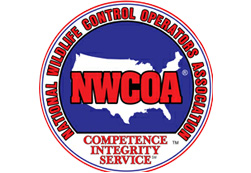NY/NJ SKUNK REMOVAL
Skunks are slow-moving mammals and members of the weasel family. They can be difficult when they feel at risk, which is why removal may be difficult. Skunks are often known for their distinctive and sulfurous spray when under attack. They are commonly identified by their jet-black fur with one or more white stripes running down their backs. One skunk species looks as though it is wearing a hood, with neck hair spread out into a ruff. Other skunks are spotted instead of striped. Humans are often frightened of skunks because of their ability to spray a foul and pungent skunk odor to defend against predators. A striped skunk will be about as big as a house cat.

Skunks are scavengers and will eat anything from bugs to garbage. If a skunk finds a tasty morsel on your property, chances are they’ll start visiting more often. Skunks are nocturnal, so you’re most likely to see them and smell them at night and in the early morning when they’re out scavenging for food. Skunks can and do eat anything; birds eggs, bugs and larvae, human wastes, small rodents, you name it – they’ll eat it.
Skunks and Rabies
Skunks can carry rabies, but it is important to remember that not every skunk is rabid. Only if an adult skunk seen in the daytime is showing abnormal behaviors such as paralysis, unprovoked aggression, moving in circles, self-mutilation, or foaming at the mouth get away from it. NY-NJ Wildlife Removal should be called immediately.
All skunks seem able to dig their own burrows but will also use abandoned dens of other animals, hollow logs, wood or rock piles, under buildings, stone walls, hay or brush piles, and trees or stumps. The skunk’s main defense is a complex chemical substance that includes sulfuric acid. It can be fired from either one of two anal glands. These glands can target independently of each other. Because of this ability, skunks will stand and face a threat rather than run away.
Skunks in Your Neighborhood
Occasional skunk sightings in a neighborhood don’t necessarily mean there is a problem. Measures can be taken to discourage skunks from sticking around. These include removing garbage and pet food left out at night and eliminating convenient denning sites such as wood and rock piles, elevated sheds, openings under concrete slabs and porches, and access to crawl spaces under houses.
Skunks are usually announced more from smell than sight. Musk’s odor might linger for days where a skunk has sprayed. Persistent, faint musk smells can often be a sign of a den. If you see a 4-6 inch diameter hole under a building or woodpile, it may indicate a den. If you discover a den that you suspect might belong to a skunk, call NY-NJ Wildlife Removal to properly and safely remove the skunk.


Our trained technicians will examine the den, place trapping materials inside a one-way door system. Then, the skunk can be caught. After, they will permanently repair any damage from the skunk. Sterilizing the area and den is as important as the elimination itself. Our trained trappers use an EPA registered and an FDA and OSHA-compliant broad-spectrum disinfectant. It is bactericidal, virucidal, tuberculocidal, fungicidal – with proven 100% elimination of these diseases and more.
For a complete inspection and evaluation please contact us and we will be happy to make an appointment at your convenience.









